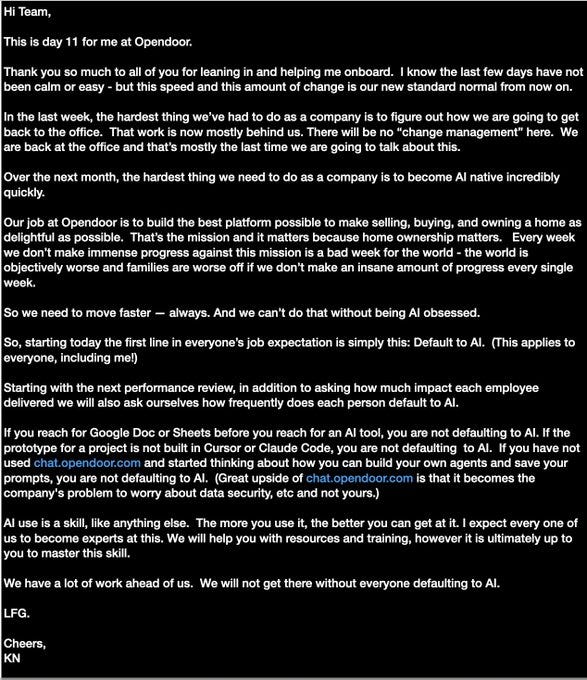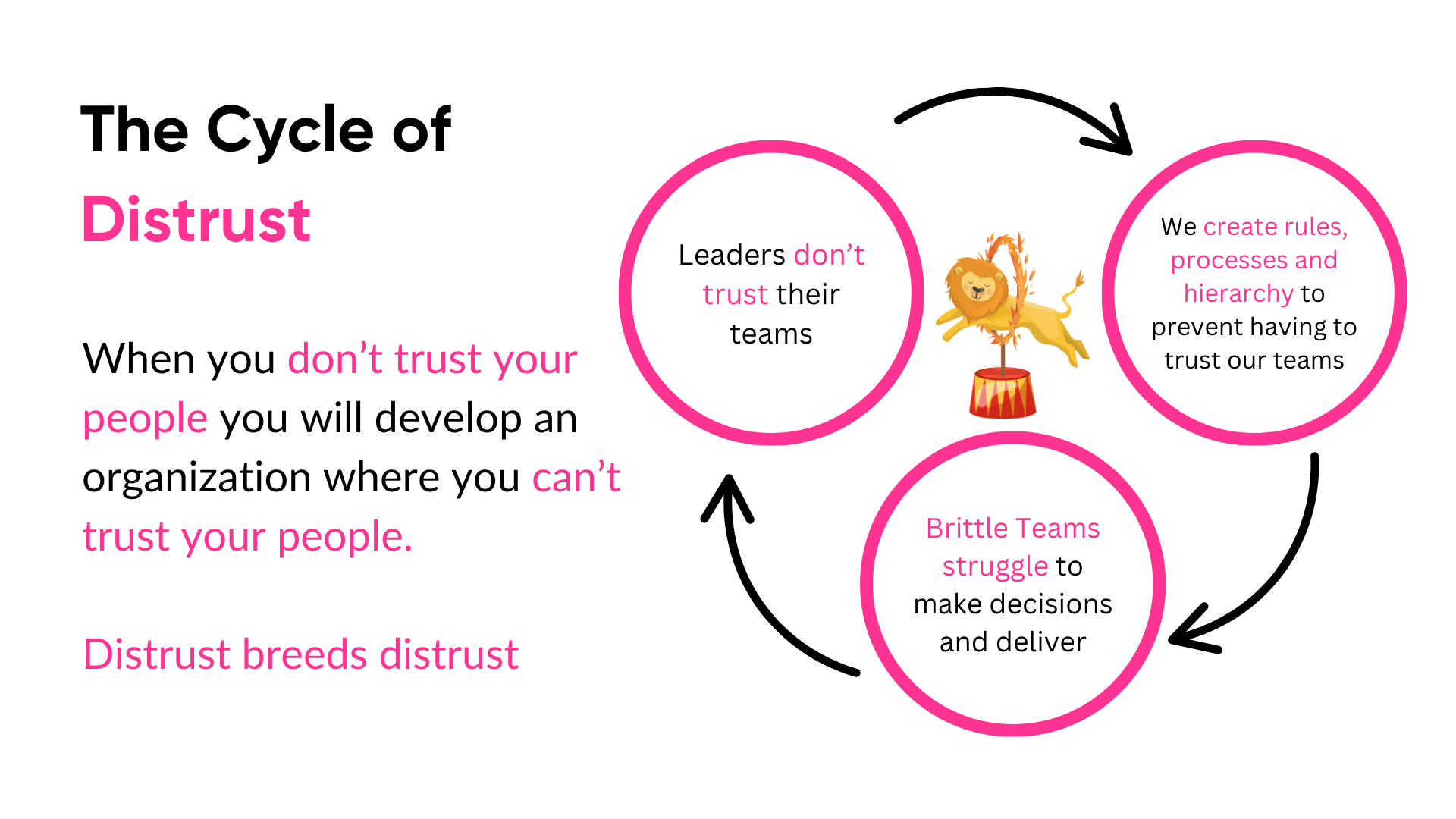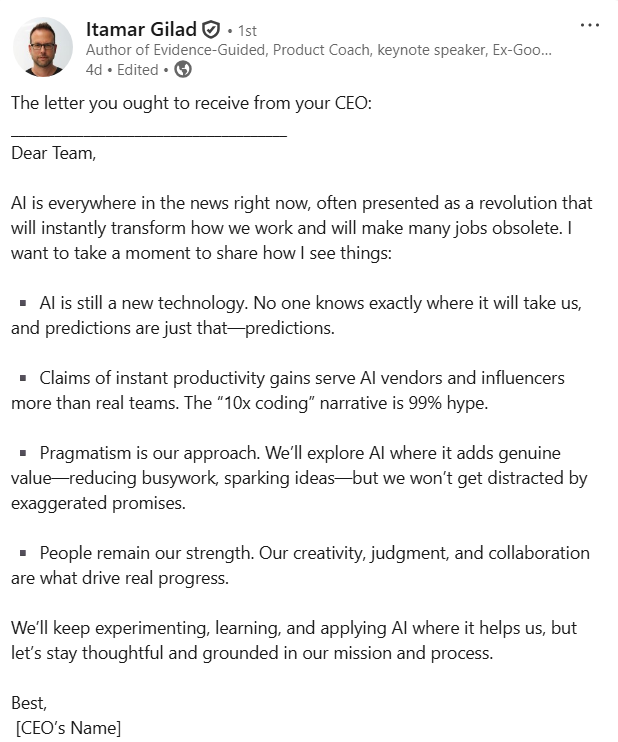Most Organizations Will Never Reap the Benefits of AI
If You Believe AI is the Bottleneck, You're Clueless About the Real Bottleneck
Most organizations will never reap the full benefits of AI and the reason has nothing to do with AI.
Let’s talk about a real-world example of an organization that won’t reap the benefits of AI, despite trying to level everyone up in the realm of AI.
Recently a CEO sent the following e-mail to their employees. I wanted to share it because it’s the perfect example of what NOT to do:
SHOCKING RIGHT?
After reading the e-mail, I can conclude they will NEVER reap the full benefits of AI. The most important obstacle for AI adoption completely flew over the CEO’s head *woosh*.
Repeat after me:
AI works best in high-performing teams, if you don’t trust your people, you will never have high-performing teams, and you will never reap the benefits of AI.
Why do I conclude this CEO places little trust in his employees? For at least five reasons:
He’s shooting from the hip: what does he know about all the real problems their employees face how to move faster and how ANY of those problems are less important than AI after being there only for 11 days?
There might be a way to go even faster without using AI. He doesn’t trust his employees to tell them how they can move faster without AI.
He doesn’t trust them to make the right judgement call. ‘Default to AI’ signals: I don’t trust your judgement cals. Listen to me and default to AI (which is batshit insane advice).
People won’t learn AI without including it in their performance review.
Doesn’t trust them to work from home and the default is working at the office, as alluded to in the e-mail.
What do we know about high-performing teams? It’s that it all starts with trust. If you don’t trust your teams, you’ll never have high-performing teams.
Here you can hear Simon Sinek talking about the importance of Trust vs. Performance:
All this CEO is doing, is kicking off the Cycle of Distrust.
Once you’re in the Cycle of Distrust, things tend to go downhill quickly.
When leaders don’t trust their teams, they create rules, processes, layers, departments, checkpoints, hierarchy and other internal obstacles so they maintain the illusion of control while they actively distrust their teams.
The teams find themselves more and more occupied with the internal bureaucracy related to the work than the actual work itself. As a result, they struggle even more to make decisions and deliver.
Because the teams are struggling to deliver as promised, the leaders introduce even more bureaucracy to gain back the illusion of control. As a consequence, the team struggles.
The end result is a fly wheel where the ineffective organization becomes even more ineffective and hostile towards teams and teamwork over time.
If you don’t trust your teams you will develop an organization where you can’t trust your teams. Distrust breeds distrust.
Itamar Gilad, author of Evidence-Guided and ex-Google PM, created an example of a much more reasonable, realistic and respectful email. I wish CEOs would use his email as a template for talking about AI to their teams:
If you believe the bottleneck to moving faster is AI, all that means you haven’t figured out the REAL bottleneck yet. You’re deluding yourself about the importance of AI. What a wonderful world would if we could reduce something complex as the performance of your organization to something as simple as AI adoption.
This CEO is not helping to create an organization that’s ever going to reap the full potential of AI. All they’re doing is creating brittle teams that will struggle to make decisions and deliver.
But at least now they’re going to struggle even better and faster - by using AI.
For any CEO who just started: don’t send an email like this on day 11.
In fact, never send an email like this.
The only message this sends to your highest performers: it’s time to leave for a better place where they respect and trust me.
But hey, you’re the big boss CEO and you don’t need any of these pesky and demanding high-performers right?
AI got your back, just wait and see!
You’ve still got 99 problems, but not doing AI ain’t one.
Redirect your AI FOMO towards your organization and prepare them for having high-performing teams instead of disconnected silos and departments.






What a great piece (as usual)!
Just to complement, based on the bit of knowledge I happen to have in the matter, I think there's also ways leaders add to "complexity" by following more soft approaches (as opposed to harder ones like introducing bureaucracy). That's when there's an overreliance on training and attempting to change people's "mindset" as coping mechanism for lack of cooperation. in the end, both tend to make harder to make decisions and move forward, and breeds up distrust.
Why does the first CEO still have employees… why not default to AI for all company activities, and just supervise the AI and evaluate the results? That email was insane. As for the article—really good!